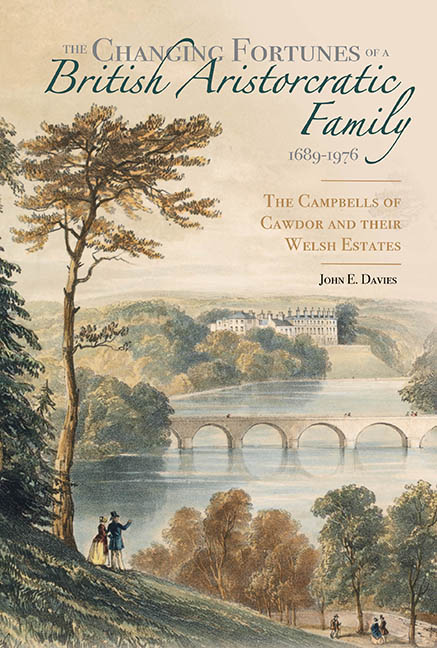 The Changing Fortunes of a British Aristocratic Family, 1689–1976
The Changing Fortunes of a British Aristocratic Family, 1689–1976 Book contents
- Frontmatter
- Contents
- List of Illustrations
- Acknowledgements
- List of Abbreviations
- Pedigree
- Introduction
- 1 Cawdor and Campbell
- 2 Estate Administration
- 3 The Agricultural Estate: The Cawdors as Farmers and Landlords
- 4 The Cawdors as Industrial Landowners
- 5 The Cawdors in the Community: Church and Education
- 6 The Mêlée of Local Governance
- 7 The Cawdors in Politics: Interest Building, Consolidation and Decline
- 8 Private and Exclusive Lives
- 9 The End of the Welsh Estates
- Conclusion
- Bibliography
- Index
3 - The Agricultural Estate: The Cawdors as Farmers and Landlords
Published online by Cambridge University Press: 21 March 2020
- Frontmatter
- Contents
- List of Illustrations
- Acknowledgements
- List of Abbreviations
- Pedigree
- Introduction
- 1 Cawdor and Campbell
- 2 Estate Administration
- 3 The Agricultural Estate: The Cawdors as Farmers and Landlords
- 4 The Cawdors as Industrial Landowners
- 5 The Cawdors in the Community: Church and Education
- 6 The Mêlée of Local Governance
- 7 The Cawdors in Politics: Interest Building, Consolidation and Decline
- 8 Private and Exclusive Lives
- 9 The End of the Welsh Estates
- Conclusion
- Bibliography
- Index
Summary
Although most of the Cawdor estates were let out to tenants, the family, with the help of their agents and bailiffs, played a commendable role in promoting improved methods of farming on the estate and further afield. This was accomplished through adoption of new techniques on the home farms which, it was hoped, would be imitated by the tenants, and through participation in local and national organisations which were set up to inform landlords and tenant farmers alike about new techniques. Whether at home or away, the first baron was an inveterate visitor to other gentlemen's farms, both nearby, or when on journeys within Britain or even Europe. His diary entries testify to his knowledge of farming. For instance, whilst travelling from Castle Howard to London in April 1817, he stopped off at Belvoir in Derbyshire, and had this to say about the home farm:
went over the whole Demesne Farm with [the bailiff] which is in very good order as to Crops, Fences and Grass grown. Sheep new Leicester very good Cattle all sorts most crossed with Alderney for the Dairy which is well managed and very productive cream excellent and a quantity of very good cheese 24 cows at present in milk in all 33 or 4. the last winter they add [sic] 3 or 4 acres of Carrots for them which assisted the milk greatly.
Such visits afforded practical knowledge which often materialised at Stackpole: in March 1816 he watched the threshing machine in operation at nearby Orielton, and by October of the same year he had one in operation at Stackpole. By dint of such visits, as well as reading agricultural theorists such as Arthur Young and William Marshall and discussions with fellow agriculturalists such as Marshall, Thomas Johnes of Hafod, John Mirehouse and Charles Hassall, Campbell formed his ideas on how to improve agriculture and practised them on his home farms at Stackpole and later Golden Grove.
At Cawdor, some improvement in the form of tree planting had been undertaken by Sir Archibald Campbell in the 1720s.6 However, further interest in agricultural advances was only implemented after the Campbells’ mid-eighteenth- century election success in Nairn and Inverness-shire, which required renewed activity on the estate.
- Type
- Chapter
- Information
- The Changing Fortunes of a British Aristocratic Family, 1689–1976The Campbells of Cawdor and their Welsh Estates, pp. 54 - 98Publisher: Boydell & BrewerPrint publication year: 2020


